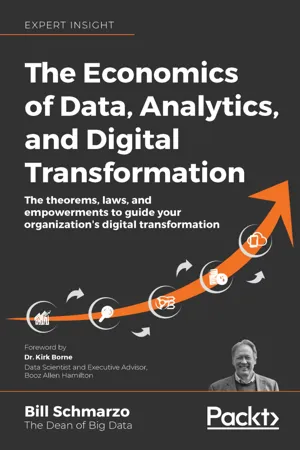
The Economics of Data, Analytics, and Digital Transformation
The theorems, laws, and empowerments to guide your organization's digital transformation
Bill Schmarzo
- 252 pages
- English
- ePUB (mobile friendly)
- Available on iOS & Android
The Economics of Data, Analytics, and Digital Transformation
The theorems, laws, and empowerments to guide your organization's digital transformation
Bill Schmarzo
About This Book
Build a continuously learning and adapting organization that can extract increasing levels of business, customer and operational value from the amalgamation of data and advanced analytics such as AI and Machine Learning
Key Features
- Master the Big Data Business Model Maturity Index methodology to transition to a value-driven organizational mindset
- Acquire implementable knowledge on digital transformation through 8 practical laws
- Explore the economics behind digital assets (data and analytics) that appreciate in value when constructed and deployed correctly
Book Description
In today's digital era, every organization has data, but just possessing enormous amounts of data is not a sufficient market discriminator. The Economics of Data, Analytics, and Digital Transformation aims to provide actionable insights into the real market discriminators, including an organization's data-fueled analytics products that inspire innovation, deliver insights, help make practical decisions, generate value, and produce mission success for the enterprise.The book begins by first building your mindset to be value-driven and introducing the Big Data Business Model Maturity Index, its maturity index phases, and how to navigate the index. You will explore value engineering, where you will learn how to identify key business initiatives, stakeholders, advanced analytics, data sources, and instrumentation strategies that are essential to data science success. The book will help you accelerate and optimize your company's operations through AI and machine learning.By the end of the book, you will have the tools and techniques to drive your organization's digital transformation.Here are a few words from Dr. Kirk Borne, Data Scientist and Executive Advisor at Booz Allen Hamilton, about the book: "Data analytics should first and foremost be about action and value. Consequently, the great value of this book is that it seeks to be actionable. It offers a dynamic progression of purpose-driven ignition points that you can act upon."
What you will learn
- Train your organization to transition from being data-driven to being value-driven
- Navigate and master the big data business model maturity index
- Learn a methodology for determining the economic value of your data and analytics
- Understand how AI and machine learning can create analytics assets that appreciate in value the more that they are used
- Become aware of digital transformation misconceptions and pitfalls
- Create empowered and dynamic teams that fuel your organization's digital transformation
Who this book is for
This book is designed to benefit everyone from students who aspire to study the economic fundamentals behind data and digital transformation to established business leaders and professionals who want to learn how to leverage data and analytics to accelerate their business careers.
]]>
Frequently asked questions
Information
4
University of San Francisco Economic Value of Data Research Paper

Abstract
- How does an organization identify and prioritize the business use cases upon which to focus its data and analytics initiatives?
- How does an organization determine the economic value of the data that supports the organization's business use cases?
- How does an organization create a framework that facilitates the capture and reuse of the organization's data and analytic assets?
- What is the role of the data lake, data governance, data quality, and other data management disciplines in managing, protecting and enhancing the organization's data and analytic assets?
Introduction
- A framework to facilitate the capture, refinement and sharing of the organization's data and analytic assets, and
- A process to help organizations prioritize where to invest their precious data and analytic resources.